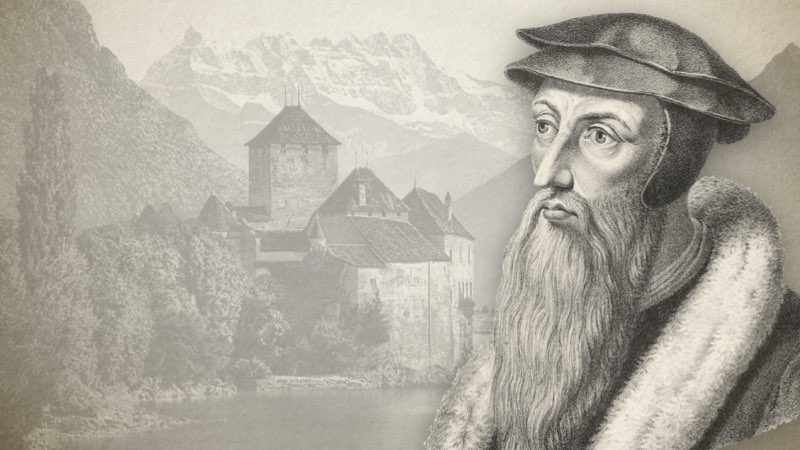John Calvin
John Calvin (1509-1564) was a French pastor, theologian, writer and leading reformer during the Protestant Reformation. His most popular works are his “Institutes Of The Christian Religion” and his commentaries on most books of the Bible. He set forth the absolute sovereignty of God in history and salvation, ascribing all glory to the One with Whom we have to do—the TriUne Jehovah. It is from the teachings of Calvin that the Presbyterian churches emerged. The label which bears his name (“Calvinism”) refers not to all of the teachings he espoused, but rather, to those teachings dealing with the salvation of sinners, otherwise known as the Five Points of Calvinism, or, the Doctrines of Grace.
John Calvin's Institutes Of The Christian Religion, Book 1 (Complete)
John Calvin's Institutes Of The Christian Religion, Book 2 (Complete)
John Calvin's Institutes Of The Christian Religion, Book 3
-
Book 3: Chapter 25, Of The Last Resurrection.
Although Christ, the Sun of righteousness, shining upon us through the gospel, has, as Paul declares, after conquering death, given us the light of life; and hence on believing we are said to have passed from “death unto life,” being no longer strangers and pilgrims, but fellow citizens with the saints, and of the household of God, who has made us sit with his only begotten Son in heavenly places, so that nothing is wanting to our complete felicity; yet, lest we should feel it grievous to be exercised under a hard warfare, as if the victory obtained by Christ had produced no fruit, we must attend to what is elsewhere taught concerning the nature of hope. For since we hope for what we see…
-
Book 3: Chapter 24, Election Confirmed By The Calling Of God
But that the subject may be more fully illustrated, we must treat both of the calling of the elect, and of the blinding and hardening of the ungodly. The former I have already in some measure discussed (chap. 22, sec. 10, 11), when refuting the error of those who think that the general terms in which the promises are made place the whole human race on a level. The special election which otherwise would remain hidden in God, he at length manifests by his calling. “For whom he did foreknow, he also did predestinate to be conformed to the image of his Son.” Moreover, “whom he did predestinate, them he also called; and whom he called, them he also justified,” that he may one day…
-
Book 3: Chapter 23, Refutation Of The Calumnies By Which This Doctrine Is Always Unjustly Assailed
The human mind, when it hears this doctrine, cannot restrain its petulance, but boils and rages as if aroused by the sound of a trumpet. Many professing a desire to defend the Deity from an invidious charge admit the doctrine of election, but deny that any one is reprobated (Bernard. in Die Ascensionis, Serm. 2). This they do ignorantly and childishly since there could be no election without its opposite reprobation. God is said to set apart those whom he adopts for salvation. It were most absurd to say, that he admits others fortuitously, or that they by their industry acquire what election alone confers on a few. Those, therefore, whom God passes by he reprobates, and that for no other cause but because he…
-
Book 3: Chapter 22, This Doctrine Confirmed By Proofs From Scripture
Many controvert all the positions which we have laid down, especially the gratuitous election of believers, which, however, cannot be overthrown. For they commonly imagine that God distinguishes between men according to the merits which he foresees that each individual is to have, giving the adoption of sons to those whom he foreknows will not be unworthy of his grace, and dooming those to destruction whose dispositions he perceives will be prone to mischief and wickedness. Thus by interposing foreknowledge as a veil, they not only obscure election, but pretend to give it a different origin. Nor is this the commonly received opinion of the vulgar merely, for it has in all ages had great supporters (see sec. 8). This I candidly confess, lest any…
-
Book 3: Chapter 21, Of The Eternal Election, By Which God Has Predestinated Some To Salvation, And Others To Destruction
The covenant of life is not preached equally to all, and among those to whom it is preached, does not always meet with the same reception. This diversity displays the unsearchable depth of the divine judgment, and is without doubt subordinate to God’s purpose of eternal election. But if it is plainly owing to the mere pleasure of God that salvation is spontaneously offered to some, while others have no access to it, great and difficult questions immediately arise, questions which are inexplicable, when just views are not entertained concerning election and predestination. To many this seems a perplexing subject, because they deem it most incongruous that of the great body of mankind some should be predestinated to salvation, and others to destruction. How ceaselessly…
-
Book 3: Chapter 20, Of Prayer—A Perpetual Exercise Of Faith; The Daily Benefits Derived From It
From the previous part of the work we clearly see how completely destitute man is of all good, how devoid of every means of procuring his own salvation. Hence, if he would obtain succour in his necessity, he must go beyond himself, and procure it in some other quarter. It has farther been shown that the Lord kindly and spontaneously manifests himself in Christ, in whom he offers all happiness for our misery, all abundance for our want, opening up the treasures of heaven to us, so that we may turn with full faith to his beloved Son, depend upon him with full expectation, rest in him, and cleave to him with full hope. This, indeed, is that secret and hidden philosophy which cannot be…


